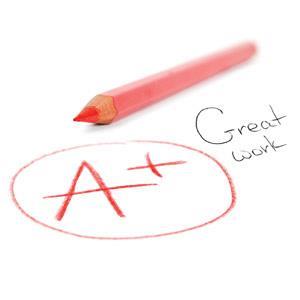Michael Seery highlights the importance of carefully-designed writing activities in enabling students to build their scientific writing skills

Students pursuing a career in science need opportunities to develop their writing skills so they can communicate scientific results, procedures and arguments to a variety of audiences.
In chemistry education, a lot of writing effort is directed at laboratory reports, where students mimic a research article by providing an introduction, procedure, data obtained and an analysis of what that data means. Another common approach to expose students to the process of writing is to have them summarise journal articles or other scientific pieces, where they are asked to present the main findings of an article and the basis for these conclusions. However, many studies show that while these kinds of activities improve basic writing skills such as referencing, they do not improve the ability to explain context or develop an argument.
Both of these activities may suffer from confusion in the purpose of the activity. We can distinguish between writing to learn – writing activities where the purpose is to learn more about the science – and learning to write – activities designed to improve students’ ability to write. Activities such as summarising a journal article may be limited in developing students’ ability to write because students are diverting attention to understanding the chemistry involved instead of considering how best to convey the central arguments and ideas of the article. It follows that activities with the purpose of helping students to improve their writing should have as their subject chemistry that students are already familiar with.
Assignment design
We can continue the effort of focusing students on the writing activity itself by carefully considering the design of the assignment. Writing as a skill takes time to develop, and the progressive development of this skill can be mapped out over a term, a year or even a course. Jeffery Kovac and Donna Sherwood have developed a table that summarises a conceptual hierarchy of forms of writing for chemistry educators (see Table 1).1
| Task | Description |
|---|---|
| 1 Listing | Display of important terms |
| 2 Definition | Explanation of word or concept |
| 3 Seriation | Ordered list or description of a procedure |
| 4 Classification | Application of specific categories to a specific idea |
| 5 Summary | Identification of important facts/ideas in an article |
| 6 Comparison/contrast | Listing and some analysis of similarities and differences |
| 7 Analysis | Breaking down a complex idea into its constituent parts |
| 8 Argument | Use of facts and theories to support a proposition |
This hierarchy provides a useful list of command words in assignments and gives guidance on the kinds of activities we can assign over the course of an instructional period. It might be unfair, for example, to ask students to write a piece arguing how subsequent discoveries led to modification of the postulates of Dalton’s atomic theory if we haven’t first allowed them to develop the ability to summarise. We could envisage, then, a series of writing activities that lead to the development of students’ ability to write a scientific argument (see Table 2).
The use of this hierarchy means the requirements of the assignment are clearer to students. Instead of using a generic ‘write an essay on atomic theory’ prompt, the command words associated with the hierarchy make it much easier for students to focus on what the body of text they write should be. This means they are writing with a greater purpose, rather than aiming to fill a page with text associated with a particular topic, hoping they hit on the salient points required by the teacher. The latter is a problem often seen in student laboratory reports.
| Assignment | Conceptual hierachy |
|---|---|
|
In less than one page, list and explain the postulates of Dalton’s atomic theory |
1 Listing |
|
In a one page essay, summarise the main findings of the Rutherford experiment and compare and contrast the atomic structures described by Dalton and Rutherford |
3 Seriation (explaining a procedure) 5 Summary (identifying important outcomes of experiment) 6 Compare and contrast (highlighting similarities and differences in the atomic structure as described by both experiments) |
|
In a one page essay, explain how the concept of the atom based on Dalton’s theory has been modified due to subsequent discoveries and discuss whether these discoveries have altered the essential content of the theory |
1 Listing (postulates of Dalton’s theory) 7 Analysis (identifying how subsequent theories modified understanding of the original concept) 8 Argument (making a case of whether the structure is essentially the same or different) |
As well as making the assignment expectations clearer to students, the advantage of using such a hierarchy means we can be much more specific and targeted in our feedback. Assessment and feedback can focus on how students addressed the specific requirements of the assignment in terms of the conceptual hierarchy, and hence can be more pointed in providing suggestions for how the student can improve the next piece of work in the series. Some more discussion on feedback is given in Reducing time spent on feedback.
Assignment purpose
Having considered the conceptual hierarchy, we can further clarify the assignment to students by giving more information on its purpose. Who is the assignment going to be read by? What is its rhetorical form? What type of writing is it? How long should it be?
A significant problem with a lot of writing activity we assign students is that it is seen as a one-off activity, only for the eyes of the teacher. This is endemic in laboratory reports. This results in students completing a body of writing for the purpose of that particular assignment, rather than considering the development of their writing ability. Feedback opportunities are lost, as students see that assignment as ‘done’, and move on to the next one. There is also evidence to suggest that students, in writing for their teachers, will often not explain concepts fully or be vague in certain parts they are unsure about, knowing the teacher has sufficient knowledge to fill in any gaps they leave in the text. Some studies have demonstrated that in writing for peers, students are much more likely to explain concepts more fully, and indeed, consider that assignment to have a greater purpose. This is one of the advantages of peer review as part of the assessment and feedback phase (see Reducing time spent on feedback).
Examples of assignment types
- Lab report
- Abstract
- Historical paper
- Annotated bibliography
- Proposal summary and review
- Résumé/cover letter
- Popular article
- Personal journal
- Short in-class summary
- Concept paper
- Microtheme
In order to provide greater meaning to the piece being written, assignments should clarify who the audience is. Who will be reading the piece? We typically ask students to write for someone who knows more than them (teaching staff) – an audience viewed as experts in the topic. While this has the advantage of setting expectations on the accuracy of the content, it can lead to the problems outlined above. However, setting clear goals and expectations of the assignment by using the conceptual hierarchy means this is still a worthy exercise. A second audience is one that is scientifically literate, but not an expert. These are conceptualised as classmates. A general audience, conceptualised as friends/family members, forms a third type of audience.

Each audience type will trigger a different form of expression in writing, and experience in individual situations will offer insight as to the right balance between writing coherently and explaining the underlying chemistry. The choice in a particular assignment will depend on the purpose of the assignment; whether you wish to develop students’ ability to write about a topic in detail or whether you wish to develop their ability to explain to others. The examples so far have focused on the traditional essay, but of course there are many forms of assignment (see Examples of assignment types). Indeed we are no longer restricted to students writing or typing an assignment to be viewed only by the teacher. Peter Banks wrote recently on the Education in Chemistry blog on the use of blogs in developing his own students’ writing.3 Lowell Thomson has used student blogs extensively, inviting members of the chemistry community to give feedback and thoughts on student blogs.4
The rhetorical form of an assignment is the final thing to consider. Are we asking students to explain a topic, or persuade us of a particular viewpoint, or express their own experiences? The explanatory rhetorical form is predominant in writing activities. In this case, the focus is on the subject, with the student being asked to explain a particular topic based on their knowledge and reading. These can suffer from being demotivating; students may wonder why they are being asked to summarise something that is already well documented. However, they have value, certainly in early stages of learning to write, in becoming familiar with different forms of conceptual hierarchy and in the basics of writing such as paragraph construction.
A second rhetorical form is persuasive. In this case, the focus is on the audience, with the student making a case for a particular position. This has the advantage of allowing the student to use their voice to argue for a particular point of view, and even if the content is as well-rehearsed as atomic theory, it adds an impetus in that they are aiming to convince the audience. The third rhetorical form is expressive, sadly almost absent from our curricula. Here the focus is on the writer and their own personal experience, typically seen in learning or reflective journals.
Preparing a writing activity – an example
Assignment sequence: two of three
Instructional objective
- Content: Atomic theory
- Conceptual hierarchy: Seriation, summary, compare and contrast
- Rhetorical form: Explanatory
- Length: 1 page
- Opportunity for feedback: Peer feedback loop included
Instructions to students
In a one page essay, summarise the main findings of the Rutherford experiment and compare and contrast the atomic structures described by Dalton and Rutherford. Your writing will be reviewed in the first instance by a peer who should provide you with feedback by the dates indicated. The final assignment is due by the date indicated.
It is possible to construct a series of writing activities that aim to develop students’ writing ability. A form such as the one shown in Preparing a writing activity can be used, so that the instructional objectives are made explicit in the design.
Progressive development of skills
In order for students’ writing skills to develop, they will need to develop other skills in tandem as their writing ability grows. To be able to address the lower end of the conceptual hierarchy such as listing and seriation, students will need to develop their reading skills; how to use textbooks and other sources of information. Activities such as one page summaries and reporting laboratory procedures can be useful in this regard.
As they progress through the hierarchy, they will need to develop their critical thinking, placing value on sources and judging their merit; an especially important feature when dealing with information from the internet. Compare and contrast activities and annotated bibliographies can be useful to develop these skills, which relate to the value of science.
At the upper end of the conceptual hierarchy, students will begin to develop skills such as creating a scientific argument and writing as a scientist, as they integrate a growing understanding of the nature of science.
If we can enthuse our students to develop this ability to write over the course of their time with us, we will be providing them with an education that will last a lifetime.
Michael Seery is a reader in chemistry education at the University of Edinburgh, UK
Reducing time spent on feedback

A significant consideration in planning writing assignments is the time available for assessment and feedback. While there is no avoiding the fact this will take time, some useful tips and suggestions have been reported from those who have implemented writing assignment cycles.
Length
Limit the length of the assessment. If you wish to develop students’ writing, they shouldn’t need to write much to identify where they can improve. Limit early assignments or those where you introduce a new stage of the conceptual hierarchy to 500 words or one page.
Rubrics
What are the key factors you are looking for in the piece of writing? List these out in a table and allocate them a weighting. When you are correcting, give each one a mark and pass that sheet to the student as feedback. This encourages students to reflect on their work using the rubric as a guide.
Peer feedback
Writing for peers has the advantage of giving the assignment greater purpose. Peer feedback can provide a first stage of feedback on overall comprehension and readability. A structure will need to be in place, such as a rubric, and you may need to ask peer reviewers specific questions and ask them to show evidence from the student’s writing to justify their statements. Some literature shows peers tend not to be critical, but using peer feedback can still add value to the assessment cycle.
Laboratory reports
Laboratory reports are already a place where student work is read regularly. Rethinking the structure of reports can create a means of developing student writing over time. This was the subject of a recent Education in Chemistry blogpost.2
Further reading
J Kovac and D W Sherwood, Writing across the chemistry curriculum: an instructor’s handbook. Prentice Hall, 2001
References
- J Kovac and D W Sherwood, J. Chem. Educ., 1999, 76, 1399 (DOI: 10.1021/ed076p1399)
- Learning to write about chemistry
- Student blogs
- International School Bangkok student blogs









1 Reader's comment